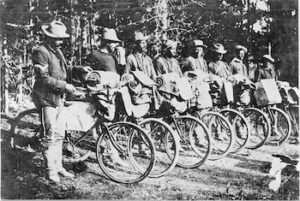
the 25th Infantry Bicycle Corps
*On this date in 1896, the 25th Infantry Bicycle Corps was formed, the first of its kind in the country. This predominantly Black regiment was part of the United States Army.
Fort Missoula's 2nd Lieutenant James A. Moss, a native of Louisiana and a West Point graduate, led the Corps. He was an avid cyclist who set out to thoroughly test the bicycle's practicality for military purposes. He contacted the A. G. Spalding Company, which provided military bicycles. The Corps, consisting of eight Black enlisted men, rode in formation, drilling, scaling fences up to nine feet high, fording streams, and pedaling 40 miles daily. Each bicycle carried a knapsack, blanket roll, and a shelter strapped to the handlebars. A leather frame case fit into the diamond of each bike, and a drinking cup was kept in a cloth sack under the seat. Each rider carried a rifle (first slung over the back, later strapped to the horizontal bar) and 50 rounds of ammunition.
The Spalding military bicycles had steel rims, tandem spokes, extra-heavy side forks and crowns, gear cases, luggage carriers, frame cases, brakes, and Christy saddles. They were geared to 68 inches and weighed 32 pounds. The average weight of the bicycles packed was about 59 pounds. Training trips consisted of rides of increasing lengths, including a trek to Lake McDonald in the Mission Mountains. By August 1896, a significant expedition was a trip from Fort Missoula to Yellowstone National Park and back – 800 miles.
The Bicycle Corps left Missoula on August 15, and a detailed log of each day's progress was kept. The Corps arrived in Yellowstone on August 24, 1896. Pleased by the success of his Yellowstone trip, Lieutenant Moss received permission to take his Bicycle Corps from Fort Missoula to St. Louis, Missouri, 1,900 miles away! The Bicycle Corps left Missoula on June 14, 1897. Accompanying Moss was a newspaper correspondent, Edward "Eddie" H. Boos, who also came along to file periodic dispatches along the route to the Daily Missoulian and the St. Louis papers. The twenty Black enlisted men who made up the rest of the command were in two squads headed by Lance Corporals William Haynes and Abram Martin. Sergeant Mingo Sanders was acting as the first sergeant of the Corps.
Food for the trip consisted of the standard military field rations: Flour, baking powder, salt, pepper, dry beans, coffee, sugar, bacon, canned beef, and baked beans. Moss arranged with the Quartermaster's Department to have rations sent ahead and placed at 100-mile intervals along the route. The Corps carried only a two-day supply of rations as an incentive to travel the scheduled 50 miles a day. The trip to St. Louis was an ordeal from the very beginning. In describing the 41-day journey, Moss reported that: "The bicycle, as a machine for military purposes, was most thoroughly tested under all possible conditions, except that of being under actual fire. The Corps went through a veritable campaign, suffering from thirst, hunger, and the ill effects of alkali water, cold, heat, and loss of sleep. A number of times, we went into camp wet, muddy, hungry, and tired. Much of the time, the roads were so bad that the Corps had to dismount and push their wheels along railroad tracks."
The 25th Infantry Bicycle Corps was greeted triumphantly at each town along the route and upon its arrival in St. Louis on July 24. Moss intended to ride from St. Louis to Minneapolis to test the Bicycle Corps on more improved roads before traveling by train back to Missoula. On August 19, 1897, the men of the Bicycle Corps returned to Missoula by rail, and the bicycles were shipped back to the Spalding Company. In February 1898, Moss requested permission to organize another Bicycle Corps to make a trip from Fort Missoula to San Francisco. However, war with Spain was imminent then, and further bicycle tests were not approved.